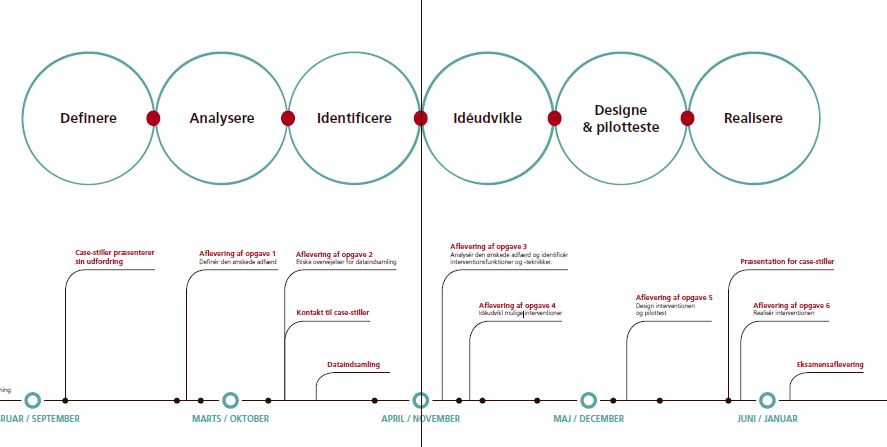WHY?
Working with intervention design will shift students’ focus from an analytical-descriptive approach to an analytical-impacting approach. From the outset, students will be working with interventions, which, in this process, means that they must discard the idea of being ‘humble witnesses’ to society and instead take on a role where they actively decide how they want to have an impact on society.
Interventions are the tool that will enable them professionally to engineer societal changes.
Learning targets:
- Students can independently initiate and implement academic and interdisciplinary collaboration and assume a professional responsibility.
- Students can manage what knowledge is needed, and they are able to establish this knowledge.
- At the skills-related level, students can articulate a specific practice problem within a behavioural framework.
- Students can collect and analyse relevant scientific studies and empirical data as well as design and develop a specific intervention, based on collaboration with an agent.
- Students can assess the implementability and effect of their suggested intervention design as well as any ethical issues.
HOW?
The course introduces three key theories about behavioural change: Individual behaviour change, behavioural economics (nudging) and social practice change. The course emphasises practical and pragmatic work with the case and the case provider and is therefore structured in six steps. These steps arise from the theories, and the course employs a textbook to provide the scientific basis for working with the steps.
Download folder about teaching design and the six steps (in danish)
The six steps are concluded by six minor written assignments. The working groups must provide feedback on each others’ assignments, and each assignment is included as part of the overall exam portfolio assignment. The overall assignment emphasises students’ ability to ‘disregard’ the specific case and more generically consider intervention design, which is based on behavioural modification. The portfolio must constitute a guidebook with practical, hands-on experience for the students in relation to how to design an intervention and an intervention process.
FACTS
Course: Intervention design
Responsible for the Course: Jakob Demant
Partners for Fall 2019: Rådet for sikker trafik / Rigshospitalets servicecenter / Danmarks Statistik / Helsingør Kommune / Københavns Politi / Østjyllandspoliti
Facilitators: Sarah Kirkegaard Verver, Peter Wick / Nina Riis
Ressources: Supported by Fonden for Entreprenørskab
READ MORE
Grundbog: Michie,S., Atkins,L.&Wes, R.(2014): The Behaviour Change Wheel. A guide to designing interventions. Silverback Publishing

